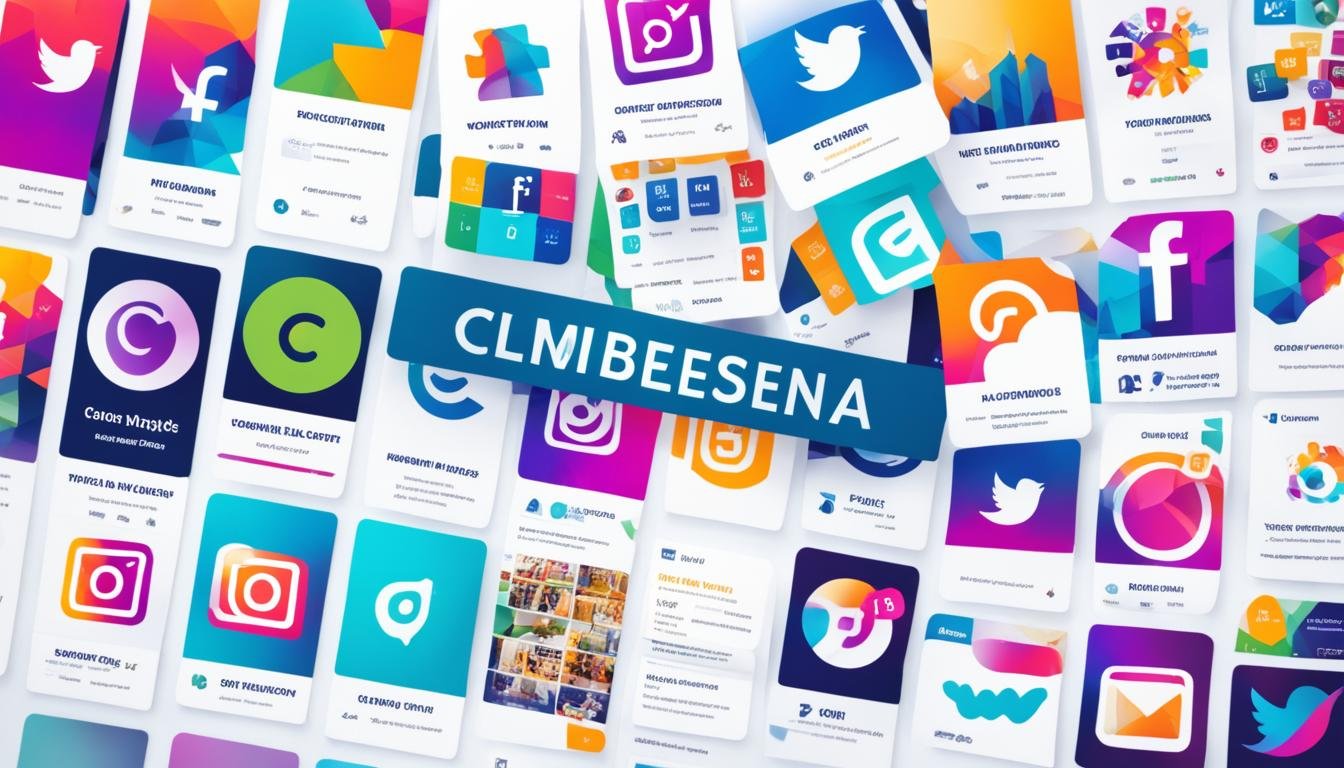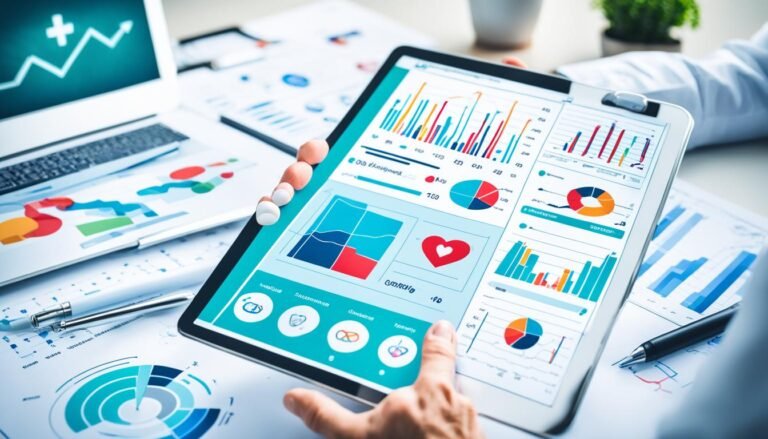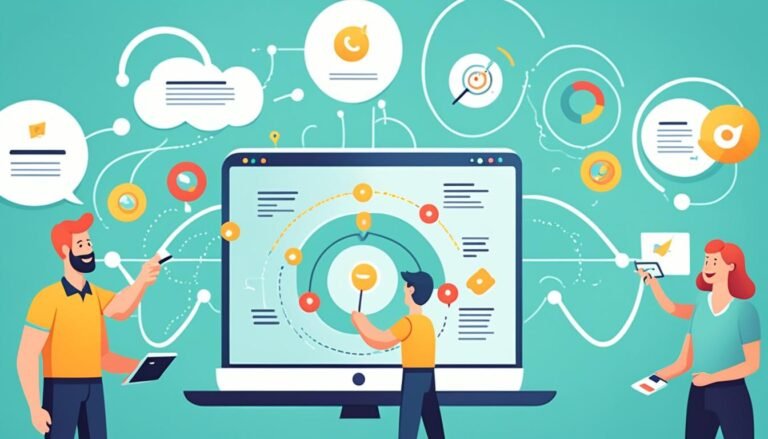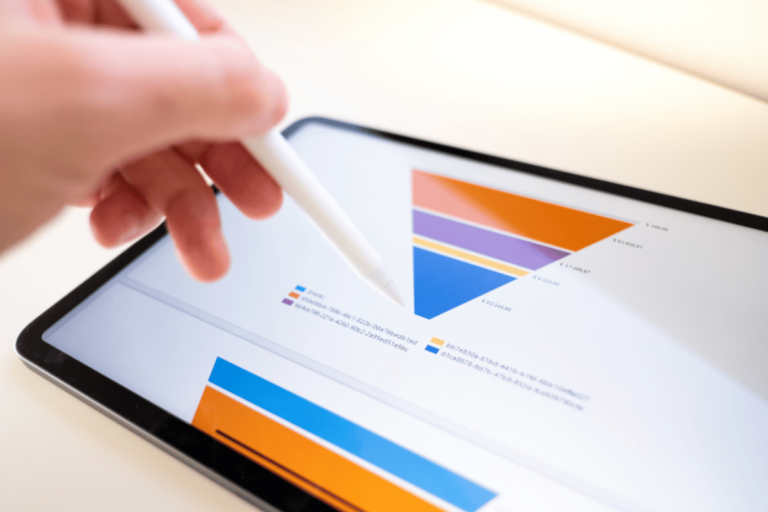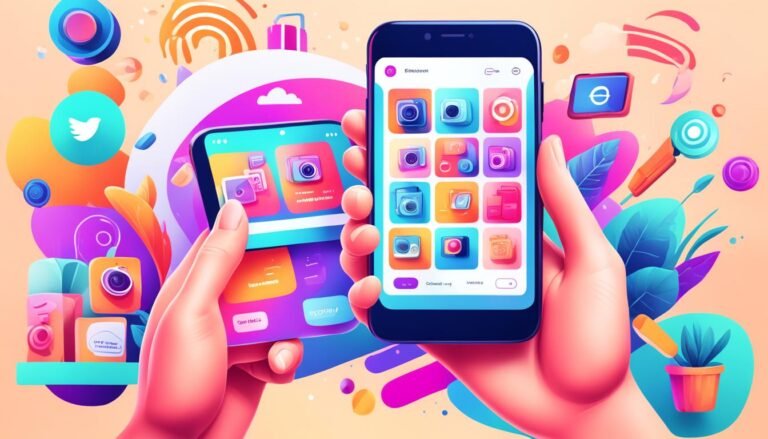Digital Marketing for Event Planners
Imagine you’re planning a corporate retreat in Las Vegas. Your to-do list is packed. You’re finalizing the venue and making sure registration runs smoothly. Plus, you need to spread the word to a global audience.
Digital marketing offers a solution. It helps you use online advertising, social media, and SEO to reach more people. 75% of event planners see social media as key for marketing. So, building an online presence is crucial.
A festival organizer saw a big change when they switched to digital tactics. By using social media ads and local SEO, they drew in 60% more attendees. This success story shows the power of digital marketing for event planners. Keep reading to learn how it can boost your events.
Key Takeaways
- Digital marketing helps build a robust event digital presence.
- Online advertising for events expands reach to a global audience.
- 75% of event planners use social media as a top marketing tool.
- Local SEO enhances visibility to local customers.
- Combining digital and traditional marketing strategies can significantly boost event attendance.
Importance of Digital Marketing in Event Management
In today’s world, digital marketing is transforming how we handle and advertise events. It allows event planners to engage with their audience more. This leads to better interaction and more successful events.
Creating an Online Presence
Having a strong digital presence is crucial for events. Social media, blogs, and websites are used to reach out to people. They help organizers keep potential attendees up to date and interested.
Reaching a Wider Audience
Digital marketing makes it easy to reach people worldwide. It breaks down physical barriers, connecting events with a global audience. SEO and focused ads help attract a diverse, larger crowd.
Tracking and Measuring Success
Success in digital marketing relies on marketing analytics for events. Monitoring website visits, ticket sales, and social media interest offers insights into effective strategies. This approach enables adjustment and improvement, leading to better future events.
Overall, digital marketing boosts event promotion and organization. It enhances attendee experiences, too. By using digital tools and analytics, event managers can make their events stand out.
Event Promotion Strategies
When promoting an event, it’s key to mix traditional and digital marketing methods. This strategy combines the best of both worlds. It makes your promotion approach solid and effective.
Combining Traditional and Digital Marketing
By using both traditional and digital marketing, you can make your event more visible. You can promote in local newspapers, magazines, and on social media. It’s a way to make sure you reach a wide variety of people.
Digital tools like Google Ads help draw in leads by targeting specific keywords. Or use traditional methods like printing ads and flyers to attract a local crowd. This approach is especially good for events focused on local communities.
- Print Advertising: Local newspapers, magazines, and flyers
- Digital Campaigns: Social media, PPC advertising, and email marketing
- SEO Optimization: Enhancing website visibility with relevant, long-tail keywords
Using a mix of these methods creates a strong promotional plan. This can boost participation and make your event more successful.
Leveraging Influencers and Partnerships
Influencer Marketing is a strong strategy for events. Working with well-known influencers can make your event stand out. It can attract more people than traditional marketing alone.
Creating partnerships with other groups or businesses can also help. By teaming up, you can reach more people with your message. This approach benefits everyone involved, giving each partner more exposure.
| Promotional Strategy | Benefits |
|---|---|
| Print Advertising | Targets local audience, still relevant for community events |
| Social Media Campaigns | High engagement, wide reach, real-time interaction |
| Influencer Marketing | Authorship, expanded reach, direct audience engagement |
| Strategic Event Partnerships | Mutual promotion, credibility boost, access to partner’s audience |
Using a blend of marketing, influencers, and partnerships is crucial. They help make your event more exciting and credible. It ensures that everyone who comes has a great time.
Social Media Marketing for Events
Using social media marketing can help events connect with more people. It lets you make interesting posts and show ads that work well. About 90% of those in charge of events use social media before the event. This shows how important Facebook, Twitter, and Instagram are in getting the word out.
Choosing the Right Platforms
It’s key to pick the best social media site for your event. Facebook is great for its large user base, with 2.23 billion users monthly. Twitter, on the other hand, is good for reaching out through influential people. 40% of Twitter users have bought something because of an influencer’s tweet. Think about which platforms will help you show your event to the most people.
Engaging Content Strategies
Making content that people like is crucial. About 73% of event planners think it’s the best way to market. You should make different kinds of posts for each platform. Use photos, videos, and team up with influencers. Content from influencers can be 11 times more effective than regular ads. Having well-known speakers can also help.
Running Social Media Ads
Running paid ads on social media is a big plus for events. These ads let you aim at certain groups and interests. This makes sure your message goes to the right people. Half of the event planners use ads to get more people to come and make their event more known.
- Use tools like Buffer, Hootsuite, and Sprout Social to make managing social media easier.
- Get people involved with giveaways and contests to grow your followers and make them more interested.
- Use hashtags smartly and regularly to make your posts more visible.
| Aspect | Statistics |
|---|---|
| Event Professionals using Social Media | 90% |
| Event Planners favoring Social Media for Marketing | 73% |
| Effectiveness of Influencer Content | 11 times higher ROI |
| Paid Social Media Ads Utilized | 50% |
Optimizing Your Event’s Website for SEO
A well-optimized event website can become the core of your online event promotion. It uses effective Event SEO Best Practices to appear more on Google. This means more people find your event online, boosting registrations and sales.
To reach more people online, event planners need to understand Website Optimization for Events. This means working on keywords, content, and making the website user-friendly. Tools like Google Keyword Planner, Ahrefs, and SEMRush are great for finding the best keywords. Doing keyword brainstorming and looking at what competitors use can guide you to the most effective words.
Here’s a look at some critical statistics:
| Search Engine Reliance for Services | Mobile Search Statistics | Consumer Behavior |
|---|---|---|
| 86% of consumers rely on search engines to find services | 54% of all consumers primarily search on their phones | 59.5% of internet traffic comes from mobile users |
| 80% of Gen Z consumers primarily search on their phones | 53% of consumers search first on social media for services |
Building good links is also key in Event SEO Best Practices. Links from trustworthy places make your site look better to Google. Plus, doing regular SEO checks ensures your site keeps up with the latest rules. This helps your site stay strong and easy to find online.
Optimizing your website for events is not something you do once and forget. It’s an ongoing effort. By creating top-notch content, ensuring your website is easy to use, and keeping up with SEO changes, you can grow the reach of your events significantly.
Effective Email Marketing for Event Planners
Email marketing is a powerful tool for event planners, providing a high $36 return for every dollar spent. To make the most of your email campaigns, focus on building your list, crafting engaging content, and using personalized strategies.
Building an Email List
Building a strong email list is key. A good list lets you send the right messages to the right people. Add people who show interest in your events, and keep your list up to date. Offering deals like early or group registration discounts can attract more subscribers.
Crafting Compelling Email Campaigns
Creating exciting content in your emails is crucial. Personalize your emails to catch the reader’s eye. Make it easy for them to respond by including a clear call-to-action. Urgency in emails has also proven to boost response rates. Plan your reminders strategically to nudge people to sign up.
| Strategy | Impact |
|---|---|
| Urgency-driven emails | Increases engagement up to 200% |
| Promotions and discounts | Enhanced registration rates |
| Personalized subject lines | Higher open rates |
| Clear Call-to-action | Boosts response rates |
Segmentation and Personalization
Segmentation and personalization make your emails hit home. Sending emails tailor-made for different groups boosts interest and response. Use what you know about your attendees to make your emails more appealing. Also, using automated emails saves time and keeps your communication sharp.
Always keep an eye on how your emails perform. Knowing the numbers helps you fine-tune your approach. Mastering these aspects helps you engage your audience effectively, leading to successful events.
Content Marketing for Event Industry Professionals
Content marketing boosts your event industry game by drawing in and educating your audience. This method helps event planners share knowledge, build trust, and improve their reputation.
Creating Valuable Content
Successful content marketing begins with valuable content customized for your audience. You need to know what they need and like. A content calendar helps keep your messages consistent. This, in turn, grows loyalty and keeps your audience interested in your events.
Using Blogs, Videos, and Infographics
Use blogs, videos, and infographics to create exciting, visual content. Blogs can preview events, giving key details and insights. Videos show your event’s best parts and what people think about them. Infographics make complex data easy to understand and share.
- Blogs: They share stories and detailed info well to engage your audience.
- Videos: They provide an immersive experience and are great for social media sharing.
- Infographics: They simplify data into easy-to-understand visuals that people love to share.
| Content Type | Purpose | Audience Engagement | ROI Potential |
|---|---|---|---|
| Blogs | Inform and educate | High | High |
| Videos | Entertain and inform | Very High | Very High |
| Infographics | Visualize data | Moderate | Moderate |
Mixing different content types leads to more sales and better return on investment. Make sure to check metrics like web traffic and social interactions. This lets you tweak your strategies so they keep hitting the mark for your audience.
Utilizing Analytics for Event Marketing Success
Analytics help steer event marketing in the right direction. They show what works well and what needs fixing. People in Marketing Analysis for Events learn a lot by looking at data. They focus on key performance indicators (KPIs) to make smart choices. This improves their work and boosts their return on investment (ROI).
Identifying Key Metrics
Web analytics is key for measuring web traffic and doing market research. It gives insights on how users act and how effective a website is. Metrics like bounce rate, click path, and engagement time are important for Event Marketing Analysis. Tools such as Google Analytics and Adobe Analytics help gather and use this data.
Adjusting Strategies Based on Data
Changing your marketing based on data is crucial for event success. Continuously checking KPIs lets event pros make quick changes. This keeps marketing plans on track with what’s popular and what people like. A strategy like this, focusing on data, keeps events moving smoothly with the latest trends.
| Analytics Stage | Description |
|---|---|
| Data Collection | Gathering raw data from various sources. |
| Data Processing | Converting raw data into meaningful metrics. |
| KPI Development | Identifying key performance indicators essential for strategy. |
| Strategy Formulation | Developing and implementing strategies based on analyzed data. |
Overall, using analytics makes event marketing smarter and better. It ensures events keep improving and getting great results.
Virtual Event Promotion Techniques
Now, it’s more important than ever to promote virtual and hybrid events rightly. By using advanced *digital techniques for virtual events*, organizers can reach people worldwide. They can make *virtual event engagement* better too. The below strategies mix both old and new ways for successful event promotion.
Marketing Hybrid Events
Hybrid events mix online and offline for the best of both worlds. They let people join from afar yet join live interactions. How to make hybrid events known:
- Social Media Campaigns: Use social media’s reach to connect with its 4.9 billion users. Share interesting content and unique hashtags to catch attention.
- Targeted Email Marketing: Send focused emails to promote *online event experiences*. Three reminder emails help get more people to join.
- Video Promotions: Studies show that two-minute videos work well. They quickly inform and draw people to the event.
- Special Discounts and Perks: Give out rewards to get more sign-ups and increase sharing of the event.
- Press Releases: Writing a strong press release can attract media focus. It helps create a larger buzz around your event.
- SEO Strategies: Use Google Ads and other tools to find key search terms. This helps more people find your event online.
It’s crucial to consider costs and ROI when promoting hybrid events. Smaller webinars can cost between $2,500 and $10,000. Larger events might spend from $20,000 to $150,000. Success is measured by looking at cost per lead (CPL), revenue, and how much attendees liked the event. This includes comparing the number of sign-ups to how many actually showed up and reviewing post-event feedback.
Keeping *virtual event engagement* up is key. Offering event recordings for later viewers increases interest. Virtual event plans can also be improved quickly, but in-person events take longer to adjust.
Event Branding and Storytelling
Creating a strong brand identity and telling captivating stories are key to any event’s success. These efforts make a message that deeply connects with attendees and those who might join. With over 90% of event planners using social media to market events, the value of Event Identity Development and Storytelling in Event Marketing is huge.
Building a Unique Event Brand
Making an event brand stand out needs a mix of consistency, creativity, and staying relevant. It’s important for event organizers to keep the brand true to the event’s goals and its audience. Many companies dedicate 20 to 50 percent of their marketing budget to creating memorable brand experiences, often through events. This marks the importance of a strong Event Identity Development. Using visual elements like motion graphics can improve brand recognition and keep attendees interested long after the event.
Crafting a Compelling Event Narrative
An unforgettable event story aims to stir emotions and strengthen connections. Studies show videos are powerful tools, equal to 1.8 million words in storytelling. Personal stories and relatable content can have a big impact, with 65% of our daily conversations focused on them, says Jeremy Hsu. By using Storytelling in Event Marketing, event organizers can create narratives that increase brand awareness and loyalty. This approach ensures attendees remember the event’s main messages and the emotions tied to them.
The aim is to create a memorable event story that fits well with the brand. Effective Crafting Event Narratives involves knowing the audience, picking the best way to share stories, and keeping guests engaged with interactive and emotional content. Event tech and social media are crucial, helping marketers deliver engaging stories to a broader audience.
Conclusion
Digital marketing is vital for event planners in today’s competitive world. It includes using social media sites such as Facebook and Twitter for promotion. Email marketing is great for direct communication. Together, these strategies boost event attendance and interaction.
Influencer marketing is also key, extending the reach of events with influencer support. Event technology like mobile apps and management software makes things easier and improves the guest experience. It’s a comprehensive strategy that highlights current event trends. This strategy helps planners to build community, grow trust, and engage attendees throughout the event journey.
It’s crucial for planners to track their digital marketing efforts to see what’s working. This data helps them constantly improve their approach. By keeping up with new tech and trends, planners can create events that are not only engaging but exceed expectations in the digital world.
FAQ
What role does digital marketing play for event planners?
Digital marketing is key for event planners to be seen online. They make websites and use social media. This helps get more people involved and interested in the event.
How can event planners create an effective online presence?
To make a mark online, event planners should start with a website and social media. They also need to create interesting content. Good search engine ratings and mobile-friendly designs are also important.
Why is it important to reach a wider audience in event management?
Reaching more people draws in a larger, diverse crowd. This boosts the event’s success and makes sure people are excited to join in.
How can event planners track and measure the success of their marketing efforts?
By using analytics, event planners see how the audience interacts with their campaigns. This feedback helps them improve their methods and increase their return on investment (ROI).
What are effective strategies for combining traditional and digital marketing?
To mix traditional and digital marketing, consider ads in print and online. This approach maximizes the event’s visibility.
How can leveraging influencers and partnerships benefit event promotions?
Working with influencers and key partners boosts an event’s visibility and trust. It allows access to a wider audience through their followers.
How should event planners choose the right social media platforms?
Choose social media platforms popular with your event’s audience. Then, create content that fits each platform well. This will make your event more visible and appealing.
What are some effective strategies for creating engaging social media content?
Use a variety of content like pictures, videos, and interactive posts. This grabs your audience’s attention and gets them to join in more.
How can event planners effectively run social media ads?
Take time to know your event’s ideal audience. Then, design ads that will grab their attention. This targeted approach will be more effective.
What are some SEO best practices for optimizing an event website?
To boost your event website’s reach, focus on keywords, a mobile-friendly design, and quality backlinks. Regularly checking and fixing SEO issues is also vital.
How do you build an effective email list for event marketing?
Gather contacts from different sources and organize them by interest. This ensures the emails you send are relevant to each group.
What should be included in compelling email campaigns?
Make your emails interesting, personal, and with clear actions to take. This way, they speak directly to people, getting different groups excited about your event.
Why is segmentation and personalization important in email marketing?
Segmenting and personalizing your emails makes them more effective. This is because each group gets messages tailored to what they care about.
How can event planners create valuable content for marketing?
Good content like blogs, videos, and infographics drives engagement. It shows your expertise and makes people more interested in your event.
Why is it important to use a mix of blogs, videos, and infographics in content marketing?
Using different types of media makes your content appealing to all kinds of people. It keeps your audience interested and engaged.
How do analytics guide event marketing strategies?
Analytics show what works and what needs changing. This insight lets event planners make smart choices that maximize their efforts and success.
What key metrics should event planners track for marketing success?
Track how engaged people are, how many take action, and your ROI. These numbers tell you what’s working and what’s not, guiding your future plans.
How can event planners adjust marketing strategies based on data?
Use data to see what’s not working and change it. This helps keep your marketing efforts effective and up-to-date.
What are some effective techniques for promoting virtual and hybrid events?
To promote virtual and hybrid meetings, focus on their convenience. Use social media, emails, and special platforms to engage both in-person and online visitors.
How can event planners build a unique event brand?
Eyecatching logos, memorable messages, and a consistent story make your brand stand out. They should all appeal to your specific audience’s interests.
What role does storytelling play in event marketing?
Storytelling makes your event’s message powerful and personal. It connects with people, increasing interest and making them want to take part.
Source Links
- Marketing Strategies to Target Event Planners | V9 Digital Insights
- 7 Steps to a successful digital marketing plan for your event
- Smooth Custom Mobile Apps for Event Planners Make Plans Easy
- Importance of Digital Marketing in Event Management | InEvent
- Importance of Digital Marketing in Event Management
- The Benefits of Digital Marketing for Event Management Company
- 3 Awesome Digital Marketing Strategies for Event Planners
- A Guide to Digital Marketing for Events: What, Why, and How? – Social Tables
- 8 Top Marketing Strategies for an Event Management Company
- The art of social media for event planners: event promotion
- Event marketing on social media: Strategy and tactics to power amazing events
- 10 Social Media Marketing Strategies for Your Events Business – The Event Planner Expo
- The Ultimate Guide to SEO for Event Marketing: Tips and Tricks From the Experts | Eventtia
- 8 SEO Strategies for Top Event Planner Websites
- SEO for Event Planners: The Top 5 Strategies to Attract and Convert Attendees | IBTM World
- The 5 Best Email Campaign Ideas for Event Planners
- A Complete Guide to Email Marketing for Events
- Email Marketing For Events: Best Practices & Examples [2024]
- Content Marketing for Events: A Proven Strategy for Success
- A Guide to Event Marketing for Event Planners | Releventful
- Event Planner Marketing: 5 Must-Know Strategies | Social Tables
- Web analytics
- What is SEO? An explanation for beginners
- What is SEO? An Introduction to SEO Basics
- 10 Virtual Event Marketing Strategies: Before, After & During
- Market Virtual Events: 12 Top Strategies | Social Tables
- 12 virtual event marketing strategies you need to succeed
- How to Use Social Media for Event Marketing
- Event Marketing: The 2024 Guide
- The Power of Storytelling in Event Marketing: How to Create Compelling Narratives
- Digital marketing in Event management
- Strategies to Boost Attendance and Engagement
- Embracing the Digital Revolution in Event Planning

